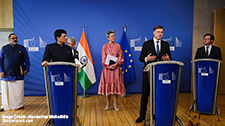The State of the Russian Oil Price Caps

Johannes Nordin
At the G20 Meeting in February, U.S. Treasury Secretary Janet Yellen took a victory lap for the two rounds of oil price caps imposed on Russia since December last year. Yellen argued they had “sharply” reduced Moscow’s income while ensuring deep discounts for emerging markets. This assessment was echoed at last month’s CERAWeek conference by Torbjorn Tornqvist, CEO of Gunvor, the world’s 4th largest crude oil trading company. Counting himself among the initial sceptics, Tornqvist observed that “the cap is […] effective” with Russian “oil flowing but at a lower price.”
These appraisals have been bolstered by economic assessments coming out of Russia in recent weeks. Not only have last year’s warnings from wary sceptics – myself included – not yet materialised, the Kremlin’s previously resilient finances have come under great pressure. Last year’s massive export-fuelled budget surpluses have swiftly turned into steep deficits since December, with surging defence expenditure parallel to a plummeting energy income. Nevertheless, it is imperative not to grow overconfident. The hitherto smooth price cap rollout is no guarantee against volatility ahead, and a miscalculated escalation could still backfire, potentially worsening the cost-of-living crisis.
Read this article by Johannes Nordin published at the International Development Research Network.
Related Publications
-
ISDP Annual Report 2023
ISDP’s Annual Report for the year 2023. We look back on 2023, a year in which tensions and conflicts captured the strategic space in ISDP’s focus areas, making headlines around […]
-
EU-Thailand FTA Negotiations: IUU Fishing and Human Rights Remain Obstacles
Thailand’s fishing industry, which at its height saw as many as 200,000 migrant workers from neighboring Laos, Myanmar, and Cambodia caught in a brutal system of abuse, withered global criticism […]
-
Trade, Connectivity and Supply Chains in EU-India Relations
In the decade and a half since 2007 when the EU and India first started their FTA negotiations, the world economic order has undergone a sea change. During that period, […]
-
Globalization and Technology See Italian Mafia Going Global
This issue brief delves into the changing landscape of Italian organized crime, focusing on the ‘Ndrangheta, a potent criminal group originating from Calabria. It explores how the ‘Ndrangheta has diversified […]
-
India-Middle East-Europe Economic Corridor: Will It Get Subsumed by Its Grand Vision?
The recently concluded Group of Twenty (G20) Summit in New Delhi under India’s presidency was, undoubtedly, a crowning moment for India. From providing the G20 with new relevance among the […]




